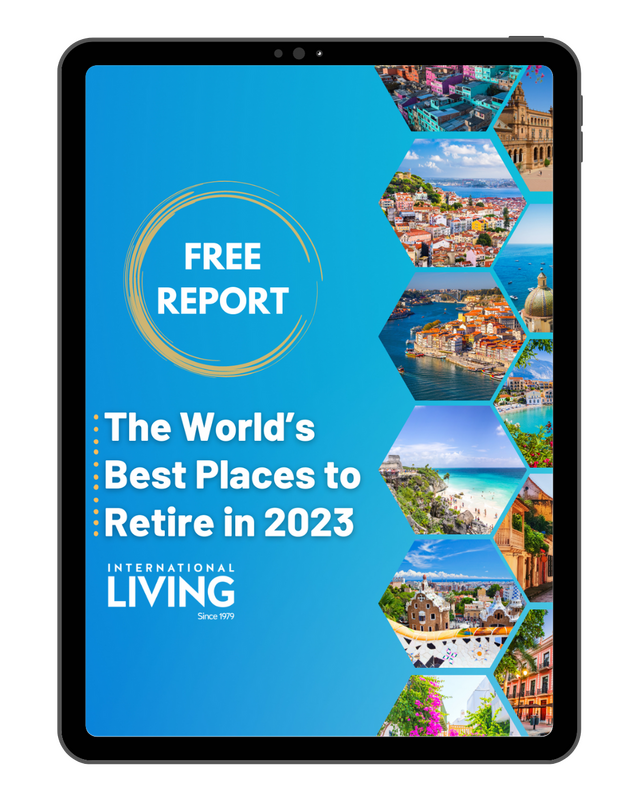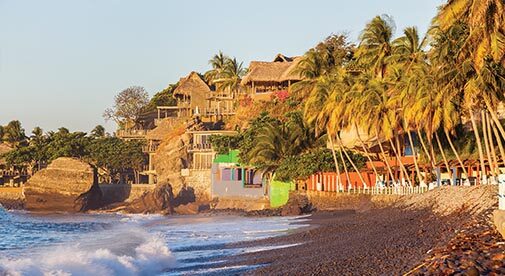Early mornings are my favorite time in San Salvador. I love to sit on my balcony and watch as the city wakes up. In the hour just after dawn, you can still hear the call of geckos and the songs of birds. It’s never really cold here, but at that time, the air is relatively cool and the smell of fresh-baked empanadas de leche wafts up to my fourth-floor balcony. Time to put on coffee and think about what I have planned for the day.
There’s no need to be up early, but it’s a habit I never lost after I moved here in July 2017. I’d been the typical driven executive when I lived in Vancouver, Canada. My life was spreadsheets, reports, meetings, commuting, donuts at my desk for lunch, out before dawn, home after dark.
Looking back, it’s obvious something had to give. But although it was me who was living the unhealthy lifestyle, it was my husband, Ron, who succumbed. He was a self-employed mechanic who always seemed to have a stress-free working life. When he passed away in January 2017, from a stroke, I just didn’t see it coming.
I moved to San Salvador because it was the first place I could find with a school that was willing to employ an English teacher with no experience. I was desperate to get away from Vancouver, and everything that was there, after Ron passed away. I gave notice to my employer, registered our house with a rental agency, and sold pretty much everything but photographs in yard sales.
Teaching boisterous teenagers and giggling children wasn’t as simple as I expected, but I loved teaching adults, learning about their lives and helping them with their careers and prospects.
In return, I gathered a group of willing guides who were so kind to me in those early days that I blush to think about it now. I was invited to homes, shown around the city, brought to the beach, just taken under the wing of these wonderful, kind people who must have recognized that I was in need, even though I never discussed my past with them.
I didn’t really need a job here—I pay $700 a month now for a two-bedroom condo in a building with 24-hour security, a lovely concierge, and balconies on two sides. It’s more luxurious than I need, really, but the rental of my place in Vancouver more than covers it, plus I have a few investments which top up my income.
These days, I choose to work because I like it.
These days, I choose to work because I like it. I do one-on-one conversation classes with adults, which feels more like chatting with a friend than anything I could describe as work. We meet in cafés or in a city park and talk for an hour; I correct their grammar and vocabulary. I usually continue beyond the allotted time because it’s so easy.
I’m considering buying a place here soon, once we see how things settle down after the coronavirus. The San Francisco area of San Salvador is a delightful international area, with leafy parks and little cafés, artisan stores, and independent restaurants. I have everything I need here. I buy groceries from the Mercado Urbano a few blocks north of my apartment for next to nothing. I go to yoga twice a week with a group of international friends at Peace and Yoga near the German School. Things are a little upside-down at the moment due to the pandemic, but my plan is to apply for a retirement visa soon. I’m eligible in age; I just need to show proof of a $1,000 per month income, which is within my means.
I pay out of pocket for any medical treatments I need from my English-speaking doctor, Luis, who charges just $30 for a visit. My dentist, José Prieto, is very reasonable too (a new crown on one of my top teeth cost $350, including a full cleaning and check-up). I live half-an-hour from the beach at La Libertad (although I’m not really a beach gal, so I don’t go often. When I do, it’s a $2 bus ride from the city).
It was a tough time when I first got here. I think I would have gone anywhere, just to change my life. I’m glad I ended up here though. El Salvador still has a reputation that it doesn’t deserve. In fact, it’s safer than a lot of Latin American countries, the roads are the best in Central America, and it’s super affordable. The president, Nayib Bukele, has stamped down hard on the gang violence and corruption that held the country back for decades and has been decisive in his response to the COVID-19 pandemic.
At the end of the civil war in 1992, El Salvador suffered from pretty bad government for years, but my experience here is that it’s a country with a bright future. I feel as safe here as I ever did in Vancouver.
As for the countryside—that has to be the most unexpected joy of all. What can I tell you? Untracked jungle forests, Maya ruins, spectacular beaches, fantastic weather, stuffed pupusas (cornmeal flatbreads), and prices that look like Mexico from 30 years ago—El Salvador’s a tiny country, but it has a whole lot of heart.

Get Your Free Report on the World’s Best Places to Retire:
Learn more about the best places in the world to retire in our daily postcard e-letter.
Simply enter your email address below to sign up for our free daily postcards and we’ll also send you a FREE report on The World’s Top 10 Retirement Havens, plus access to over 10 more free reports. Our gift to you, on our favorite destinations.
Related Articles
The World’s Best Places to Retire
The Cheapest Places in the World to Live
5 Great Places to Retire Where it’s Easy to Fit In
Upcoming Conferences
The Only 2024 Fast Track Panama Conference
If your dream retirement involves stunning beaches… lush green mountains… a warm climate with no hurricanes… first-rate healthcare… incredible value for money (a couple can live well on $2,200 a month)… and the World’s #1 Retiree Discount Program…
Join our Panama experts and expats in February and discover why Panama could be your perfect paradise.
REGISTER NOW, SEATS LIMITED: EARLY BIRD DISCOUNT HERE


.png)